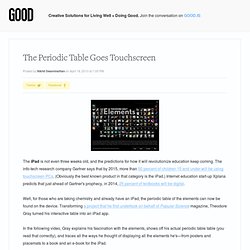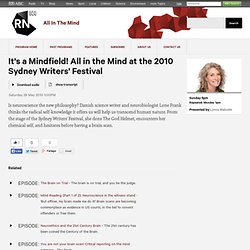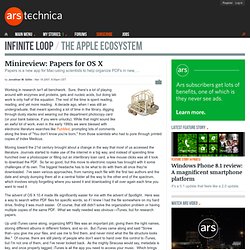

The Periodic Table Goes Touchscreen - GOOD Education. The iPad is not even three weeks old, and the predictions for how it will revolutionize education keep coming.

The info-tech research company Gartner says that by 2015, more than 50 percent of children 15 and under will be using touchscreen PCs. (Obviously the best known product in that category is the iPad.) Internet education start-up Xplana predicts that just ahead of Gartner's prophecy, in 2014, 25 percent of textbooks will be digital. Well, for those who are taking chemistry and already have an iPad, the periodic table of the elements can now be found on the device. Transforming a project that he first undertook on behalf of Popular Science magazine, Theodore Gray turned his interactive table into an iPad app. In the following video, Gray explains his fascination with the elements, shows off his actual periodic table table (you read that correctly), and traces all the ways he thought of displaying all the elements he's—from posters and placemats to a book and an e-book for the iPad. For Scholars, Web Changes Sacred Rite of Peer Review.
All In The Mind - 29 May 2010 - It's a Mindfield! All in the Mind at the 2010 Sydney Writers' Festival. Natasha Mitchell: Natasha Mitchell coming to you this week from the 2010 Sydney Writers' Festival and what a smorgasbord it was that we brought you from the festival over on ABC digital radio.

My guest today is Lone Frank, she's an award winning Danish science journalist and broadcaster who started out as a neurobiologist. And her book Mindfield asks how brain science is changing our world—and ourselves—and, herself. You'll find her experience of the so-called God helmet utterly spine-tingling. Lone, we're here to talk about the organ that Woody Allen describes as his second favourite organ. I wonder if he calls it his second favourite organ because he's actually never got to hold one. Lone Frank: Maybe, maybe. Natasha Mitchell: You, even with a PhD in neurobiology you found holding a brain for the first time remarkably bizarre, even you wanted to cry, you did cry. Lone Frank: Yeah, but that was because of the fumes...but anyway, yes, it was very, very strange. Lone Frank: Yes. The Ten Most Disturbing Scientific Discoveries. Papers : mekentosj.com : Software for Research.
Minireview: Papers for OS X. Working in research isn't all benchwork.

Sure, there's a lot of playing around with enzymes and proteins, gels and nucleic acids, but doing lab work is only half of the equation. The rest of the time is spent reading, reading, and yet more reading. A decade ago, when I was still an undergraduate, that meant spending a lot of time in the library, digging through dusty stacks and wearing out the department photocopy card (or your bank balance, if you were unlucky). While that might sound like an awful lot of work, even in the early 1990s we were blessed with electronic literature searches like PubMed, prompting lots of comments along the lines of "You don't know you're born," from those scientists who had to pore through printed copies of Index Medicus.
Moving toward the 21st century brought about a change in the way that most of us accessed the literature. The advent of OS X 10.4 made life significantly easier for me with the advent of Spotlight. This isn't a problem though. The OpenScience Project.